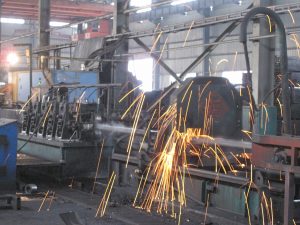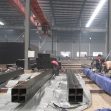Reduce Carbon in steel pipe production
The production of China hollow section tube plays a crucial role in various industries, but it also contributes to carbon emissions and environmental impact. However, steel pipe manufacturers can adopt sustainable practices and implement strategies to reduce carbon emissions throughout the production process. By prioritizing sustainability and employing innovative approaches, the industry can move towards a greener and more environmentally friendly future. Here are some effective strategies to reduce carbon in steel pipe production.
Energy Efficiency: Improving energy efficiency is a key strategy to reduce carbon emissions. Steel pipe manufacturers can invest in modern equipment and technologies that consume less energy during the production process. Upgrading to energy-efficient furnaces, optimizing heating and cooling systems, and implementing advanced control systems can significantly reduce energy consumption and subsequently decrease carbon emissions.
Renewable Energy Sources: Shifting towards renewable energy sources is an effective way to reduce the carbon footprint of the production of structural steel pipe. Manufacturers can install solar panels, wind turbines, or other renewable energy systems on-site to generate clean and sustainable energy. By relying less on fossil fuels and utilizing renewable sources, carbon emissions associated with energy consumption can be greatly reduced.
Scrap Recycling: The recycling of steel scrap is a sustainable practice that helps reduce carbon emissions in mild steel tube production. By utilizing recycled steel instead of solely relying on raw materials, manufacturers can significantly decrease energy consumption and emissions associated with the extraction and processing of virgin materials. Establishing robust scrap collection and recycling programs can contribute to a more circular and sustainable steel pipe production process.

Process Optimization: Optimizing production processes can lead to significant carbon reduction. Steel pipe manufacturers can implement advanced process control systems and automation to improve efficiency and minimize waste. By closely monitoring and optimizing parameters such as temperature, pressure, and material flow, manufacturers can achieve higher production yields of
Gi square steel pipe, reduce energy requirements, and minimize carbon emissions.
Carbon Capture and Storage (CCS): Implementing carbon capture and storage technologies can play a vital role in reducing carbon emissions in steel pipe production. CCS involves capturing carbon dioxide (CO2) emissions from industrial processes and storing them safely underground or utilizing them in other applications. By capturing and storing CO2, steel pipe manufacturers can effectively mitigate their carbon footprint and contribute to climate change mitigation efforts.
Product Design and Lightweighting: Optimizing the design of steel pipes and incorporating lightweighting techniques can also help reduce carbon emissions. By using advanced engineering techniques and materials, manufacturers can produce black iron steel pipes that are lighter, yet still meet industry standards and requirements. Lightweight pipes require less raw material and energy during manufacturing, resulting in lower carbon emissions throughout the production process.
Tel: +86 18202256900 Email: steel@fwssteel.com










